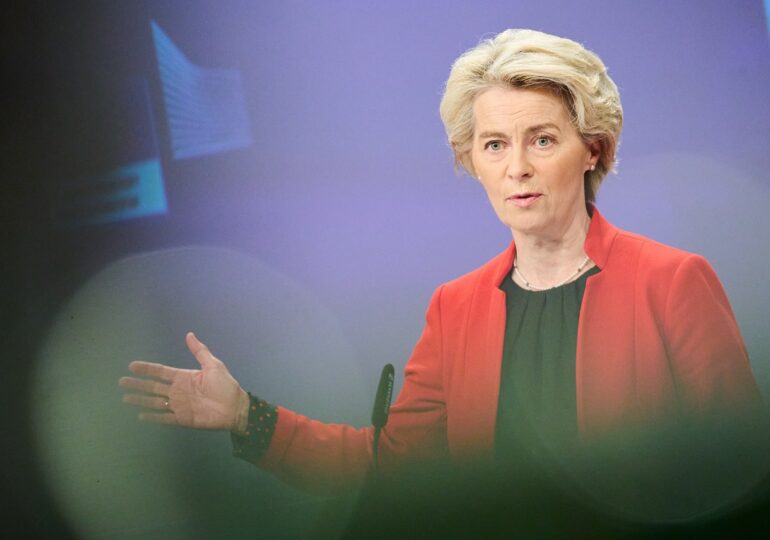If she fails to win over the entire centrist coalition, the head of the European Commission will need the support of the Greens group or even the hard right. Both options are complicated.
The President of the European Commission and the main candidate of the European People’s Party (EPP) center-right concluded the vote count on Sunday with a slim majority, which many believe will prove to be a mirage. This situation leaves her with few options to secure a new five-year term at the helm of the EU executive, as stated in an analysis published by Politico.
The balance in the European Parliament is finely poised for von der Leyen, after a surge of the far right eroded the center. She needs the support of 361 Members of the European Parliament to secure a second term. The coalition of center groups that elected her last time (EPP, Progressive Alliance of Socialists and Democrats - S&D, and the liberal Renew group) won almost 400 seats in the European elections.
However, officials from the EPP expect at least 10% of these MEPs not to vote for von der Leyen, preventing her from obtaining a majority.
What options does Ursula have
If the EU chief cannot secure enough votes from the main three groups in the European Parliament, she will be forced to make a choice:
- seek support from the Greens group, which seeks climate guarantees that the EPP rejects;
- flirt with the far-right party of Italian Prime Minister Giorgia Meloni, risking losing her coalition;
- opt for both options, hoping that everyone will simply decide it's better to deal with her than with less convenient alternatives.
That's where the calculations begin.
The Greens are in a tough spot after the election disaster, where they lost over a quarter of their mandates. Although the Greens and von der Leyen's party are in an arranged marriage, a divorce would come at the worst time.
Dutch MEP Bas Eickhout, the main candidate for the Greens, told Politico that his party wants guarantees that von der Leyen will not touch existing laws from the Green Deal.
A convergence of these seemingly irreconcilable positions will be "the biggest challenge," Eickhout said.
The party's over, now it's negotiation time
At least for now, von der Leyen can savor her victory after the EPP gained ten more mandates. She will begin a negotiation process to secure the votes she needs to retain her position in Brussels, while each party will seek to leverage its advantages.
Eickhout said the Greens could support von der Leyen, but they demand assurances that EU legislation aiming for climate neutrality by 2050 will be untouchable. He also said the Greens want promises regarding pollution reduction in agriculture, a potentially explosive issue for the EPP.
Von der Leyen has a personal interest in protecting the Green Deal. After all, it is the greatest achievement of her term. Moreover, given the election results, some Greens members might be tempted to support von der Leyen rather than end up with a Commission president who doesn't prioritize environmental policy. A senior EPP official estimated that the Greens' options could be divided.
However, any alliance would be uncomfortable. The EPP and the Greens hold almost incompatible views on essential climate issues, such as nature conservation, agriculture, and the auto industry.
The challenge took shape on Sunday evening when EPP leader Manfred Weber told Politico that the party will soon discuss his request to overturn the 2035 ban on new cars with internal combustion engines – a central pillar of the EU's efforts to promote the production of eco-friendly cars.
This would directly conflict with the Greens' position, which opposes revising the ban.
Challenges multiply as other potential partners come into play. For example, von der Leyen said she would be interested in working with Meloni's party, Brothers of Italy (Fratelli d'Italia).
However, Eickhout clarified that the Greens will never join a coalition involving the Italian party's European Parliament group, the European Conservatives and Reformists (ECR). "We definitely won't be part of that. And that's really a red line that we draw very clearly," he emphasized.
The exodus could rapidly expand. "If it's with the ECR, it's without us," said Giacomo Filibeck, Secretary-General of the center-left Party of European Socialists, whose S&D group won the second-largest number of seats in the European Parliament, on Monday morning.
Filibeck also said that protecting the Green Deal will be at the core of their political demands, but left room for an agreement: "An alliance with our green friends is certainly a possibility."
Old-School Tactics
Considering the complex dynamics of the new European Parliament configuration, von der Leyen might prefer to take the path of least resistance - one where she doesn't need the support of the Greens or the ECR.
This first involves approval from the EU's 27 national leaders, a prospect that seems more likely after French President Emmanuel Macron indicated on Monday that he would support her.
She will then have to prevent defections from her centrist coalition (EPP, S&D, and Renew). To do so, she will need to apply an old-school American tactic, according to the EPP Secretary-General Thanasis Bakolas, which in Romanian means "the whip and the sugar" - meaning to use threats or incentives to persuade MEPs to support her.
The gates to a new term will then open wider if the centrist groups attract some unaligned MEPs to their side. Around 100 MEPs are in this position, and the EPP could court more national delegations.
T.D.

